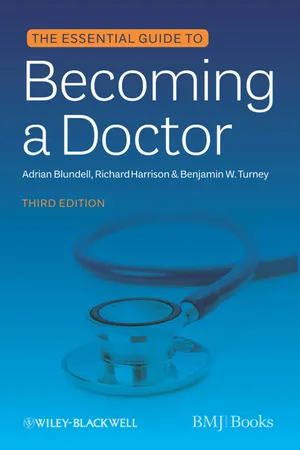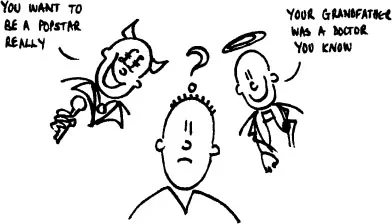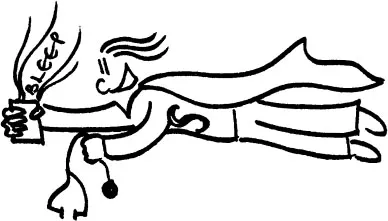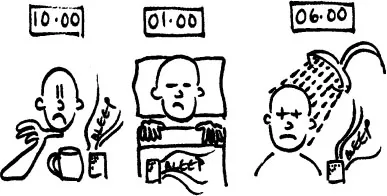![]()
Chapter 1 A challenging career
1.1 Medicine or not
The decision to study medicine at university should not be made without a great deal of thought and research into the reality of life as a doctor. At the age of 17 it can be difficult to know whether you want to go to university at all, let alone study for at least 5 years. Your future career ideas should be discussed with family and friends but the final decision needs to be an individual one. Those around you are likely to have differing views; parents and teachers may feel that medicine is a respected profession and possibly encourage you to take this path but some doctors may try to dissuade you. Speak to as many students, doctors and other healthcare professionals as possible in order to gain as many opinions as possible. Ask individuals to justify their reasoning for choosing medicine as a career and to explain why they would or would not recommend it; without experiencing life as a doctor, it is difficult to know what it will really be like. We all know friends who have avoided medicine following their personal experience with one or both parents as doctors. In comparison many students, after experiencing their own family life, do decide to follow in their parents’ footsteps. Although relatively common, try not to be persuaded or coerced into studying medicine by your family – it is YOUR decision and YOUR career for the rest of your life.
For older candidates, the decision is even more difficult. A mature student needs to be certain that the decision to study medicine is the right one as often there is more at stake; each applicant will have their own personal circumstances but returning to student life may involve leaving paid employment and moving a family around the country.
1.2 Career planning portfolio
A useful starting point on the application pathway is to buy a scrapbook or folder for developing into a useful resource full of ideas and information. Early pages should be dedicated to listing your possible career or degree choices. For each decision produce a table with two columns headed ‘Advantages’ and ‘Disadvantages’.
Possible advantages of a career in medicine
- Five years at university
- Interesting
- Virtual guarantee of job following graduation
- Reasonable salary
- Respected profession
- Diverse range of specialties
- Option to use both intellectual and technical abilities
- Continual advances in the profession
- Sociable work environment
- Good team-working opportunities
- Managerial and leadership opportunities
- Structured career
- Transferable skills
- Opportunities for working abroad
If you find the disadvantages column dominating at any point, then think carefully whether this decision is correct. Portfolios are used extensively in the medical profession, from medical students to senior doctors, as a record of training that can be used as evidence of competence (i.e. the ability to carry out one’s job). Your portfolio can be divided into different sections: academic; work experience diary; extracurricular activities; employment; managerial, leadership and organizational skills; university choices; commitment to medicine (or other degree); newspaper/journal articles; curriculum vitae. Rather than just listing achievements, it is sensible to reflect on your experiences, for example what were the good and bad bits and how they have helped towards your future career choice. This will develop into an essential resource that will aid your future career choice decision and will be useful to look through prior to interviews.
Possible disadvantages of a career in medicine
- Five years at university
- Long hours
- Lots of exams
- Risk of mistakes
- Stressful periods
- Dealing with death/suffering
- Patient expectations
- Media bashing
- Paperwork
- Lack of NHS funding
- Possible job insecurity
- Lack of flexibility in training
- Litigation (being sued)
1.3 The decision
University is only the tip of the medical career iceberg; the remaining 40 years of medicine can be quite different. There is no doubt that a career as a doctor can be challenging, rewarding and exciting, but remember that it is also hard work, stressful, tiring and, at times, mundane. Have you the right personality, not just for the university course but also in the longer term? The majority of sixth form students have no idea what university and a career in medicine will be like, and embark on this journey blinkered by this lack of insight. However, knowledge can be gained by talking to current medical students, career advisors, general practitioners, hospital doctors, and by reading books on the topic of studying medicine and perusing the medical journals. It is also necessary to spend time in and around a hospital or GP surgery, known as work experience or voluntary work. This is an essential prerequisite for obtaining a place at medical school as it shows your commitment, but it is also necessary for gaining more insight into your future career choice.
Students have differing motivations for choosing a medical career: family tradition has been discussed, others have experienced medicine as a patient, some have an interest in science, a minority have wanted to become a doctor since the dawn of time, and many just feel that they want to help people. Having experienced medicine from the point of view of being a patient or relative is useful and these experiences can be shared on application forms or at interview. Some of your friends may well know that it is their destiny to become a brain surgeon but the odds are that these people will change their minds over the forthcoming years. The idea of a specialty is different to the reality. It is not necessary for you to decide on your future career prior to applying to medical school, but if you do have some thoughts then these can be mentioned, although remember to have reasons to justify your decision. For many the final decision to study medicine will be made shortly before sending off the UCAS form. Whatever your reason for thinking medicine is your future, it is important to realize that there are other jobs and university courses that would fulfil these reasons and a life following one of these different paths could be just as rewarding. Remember that there are a number of wrong reasons for pursuing medicine as a career.
While deciding on a medical career, it is important not to be disillusioned by the negative media publicity or the drama depicted in television programmes; these are two ends of an extensive spectrum and the majority of the work of a doctor is different. In terms of adverse publicity, remember that doctors have not just started to make mistakes, that doctors probably make fewer mistakes now than ever before, and that the difference is due to the expectation and knowledge of the general public. Mistakes are now less tolerated, and with the advent of the internet patients are more aware of their diseases and also of treatment options.
If you are serious about studying to become a doctor, in addition to researching about life as a doctor (including quality work experience), it is necessary to determine that you have the right attributes and qualities. Although academic excellence does not always equate to good clinical skills as a doctor, there are minimum requirements for entry into medical school. If you have performed badly in your GCSEs or are not likely to get high grades at A level, it is unlikely that you will be offered a place to study medicine, as there is great competition. A useful starting point is to look at the UCAS website for the minimum requirements for entry to each university. Apart from academic pursuits, it is important that applicants demonstrate other interests and abilities and most candidates will have a history of sporting or musical interests and be able to demonstrate leadership and team-working experiences. All these attributes are important for a future healthcare professional, and universities are looking for well-rounded individuals.
There may be other options available if exam results are disappointing at AS level and predicted A-level grades lower than required, and some of these options are discussed in later chapters. Possibilities to consider include resitting A levels and studying a different degree at university and then applying for graduate-entry medicine at a later date. The key is getting excellent A-level grades – if you have the academic requirements for a university place, and the suitable attributes and qualities of a future doctor, then you should be able to get an interview offer, even if this means taking a year off to reapply.
The decision to study medicine is just the beginning. Now it is necessary to decide which university and, for some students, which country. It is likely you will have a great time at whichever institution you find yourself. Remember that not all universities are the same and at some the workload could be greater and the social life less. This is why research before applying could save heartache later. Once at medical school, the majority of those students who wish to become doctors do eventually make it through. Some decide that medicine is not the career for them and either leave or convert to another degree. Likewise, some students embark on other science degrees and find that medicine would be more suitable, so make the change then. If you are unsure about your future career, then a possible option might be to study at a medical school offering intercalated degrees as part of the course. For example, at Nottingham the preclinical work includes a research project in the third year that leads to the degree of Bachelor of Medical Science (BMedSci); after this a student could leave the medical school and pursue an alternative career with a degree under his or her belt.
1.4 A changing profession
Medical training and the health service have undergone radical changes in the last 5 years. It is unusual for a day to go by without some mention in the press about changes in doctor training and cuts having to be made due to financial problems. The main push is for a quality health service at an affordable price. Morale has been low due to hospital closures and job uncertainty for many healthcare professionals. It is essential as potential future doctors that even at this early stage you stay up to date with the proposed alterations to career structure, training and NHS reforms. Although it may seem irrelevant at your stage in life, the changes may well alter your decision to study medicine. One interesting aspect is that with the increased number of places at medical school and the reduction in the number of training posts, we may see unemployed doctors for the first time. Employment following graduation is virtually guaranteed but greater competition during later training may mean limited possibilities, especially in smaller specialties and popular locations. Modernizing Medical Careers (MMC) is a government-led initiative that was introduced in 2007 to make training at all levels more formalized. Following medical school, newly qualified doctors now join a 2-year Foundation programme rather than the traditional 1-year Pre-registration House Officer (previously known as the Junior House Officer year). More information about current and future training can be found in later chapters.
1.5 Planning
Planning and research are the key components in deciding and then ultimately applying for medicine. Try to prepare well in advance. Here is a checklist to help formulate a few ideas, although it is by no means exhaustive.
Choosing a medical career: a planning checklist
- Keep a scrapbook or folder: develop a plan for a medical career, divided into sections as described earlier. Remember to keep informative newspaper cuttings or journal articles and to write about your experiences rather than just listing achievements.
- Academia: at an early stage determine which subjects you need at AS and A2 level. Work hard to obtain the required marks! As well as your A-level work, consider some general reading around medical topics. Nature and the British Medical Journal are good starting points; the BMJ is one of the most widely read journals in medicine and the student version has useful articles on career planning and changes in training and also presents interesting medical cases. At a minimum you should be aware of medical advances and developments that have made the lay press and lo...



